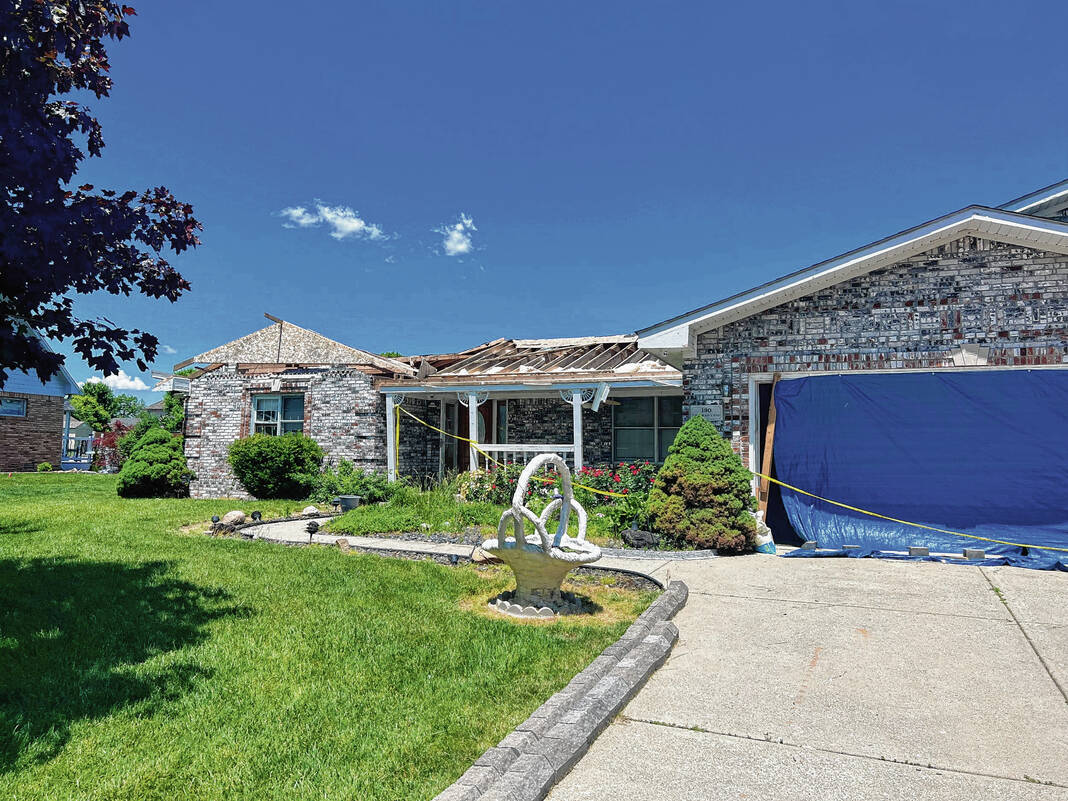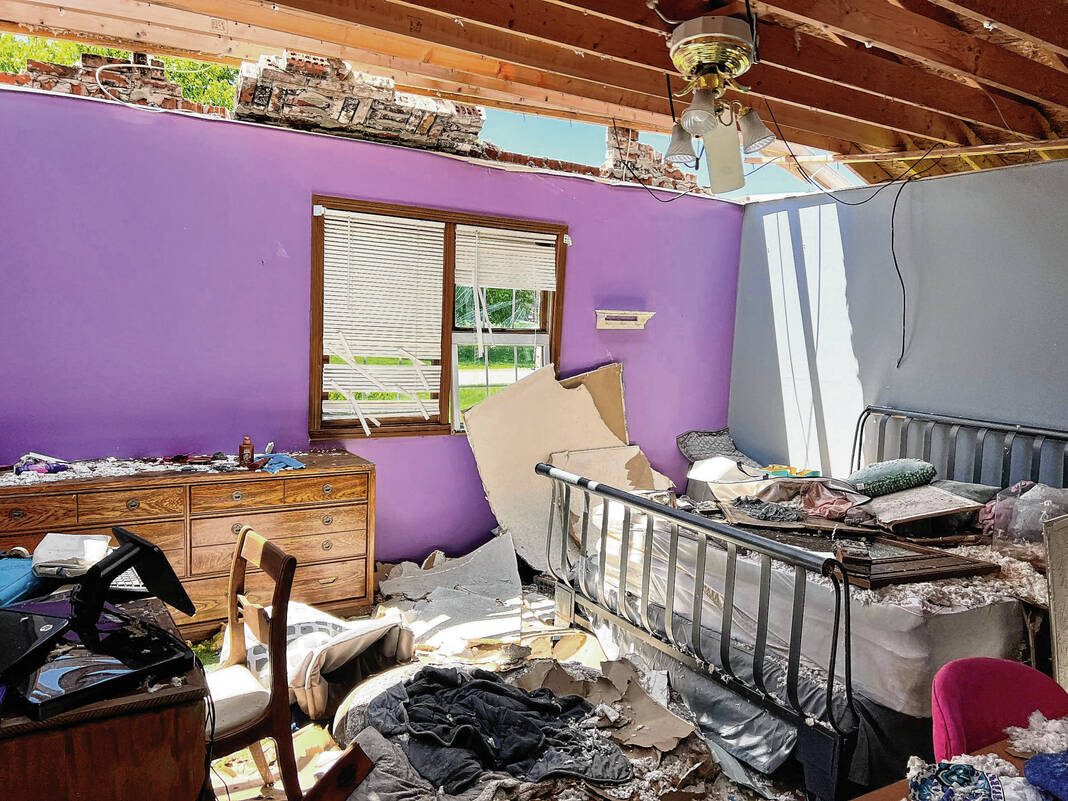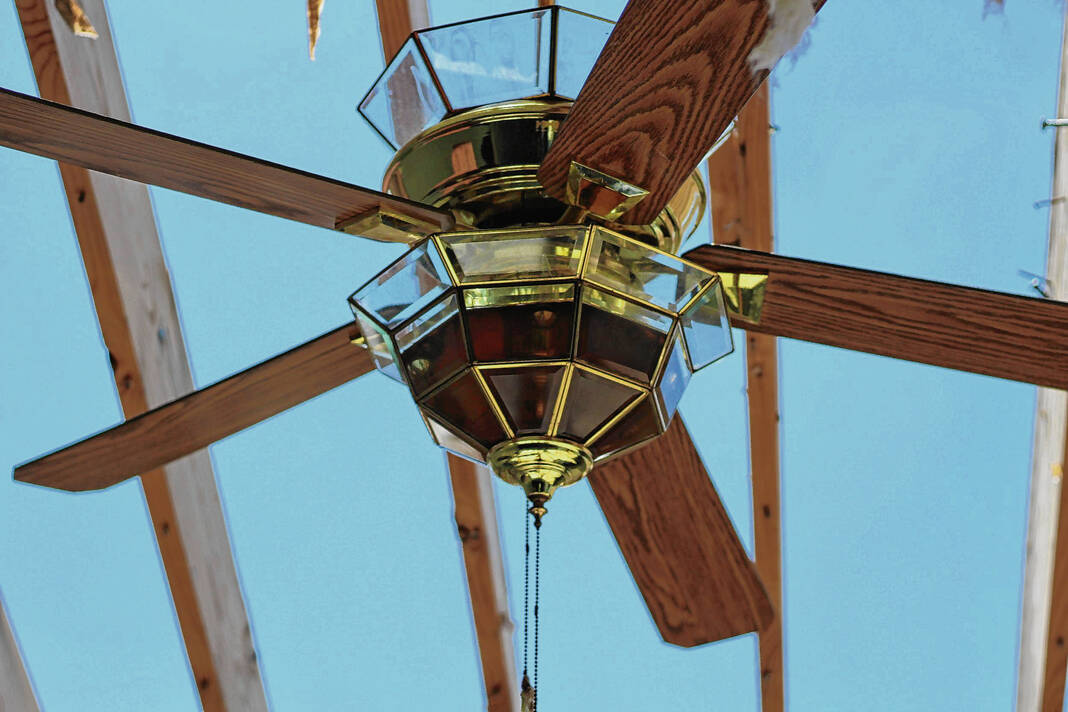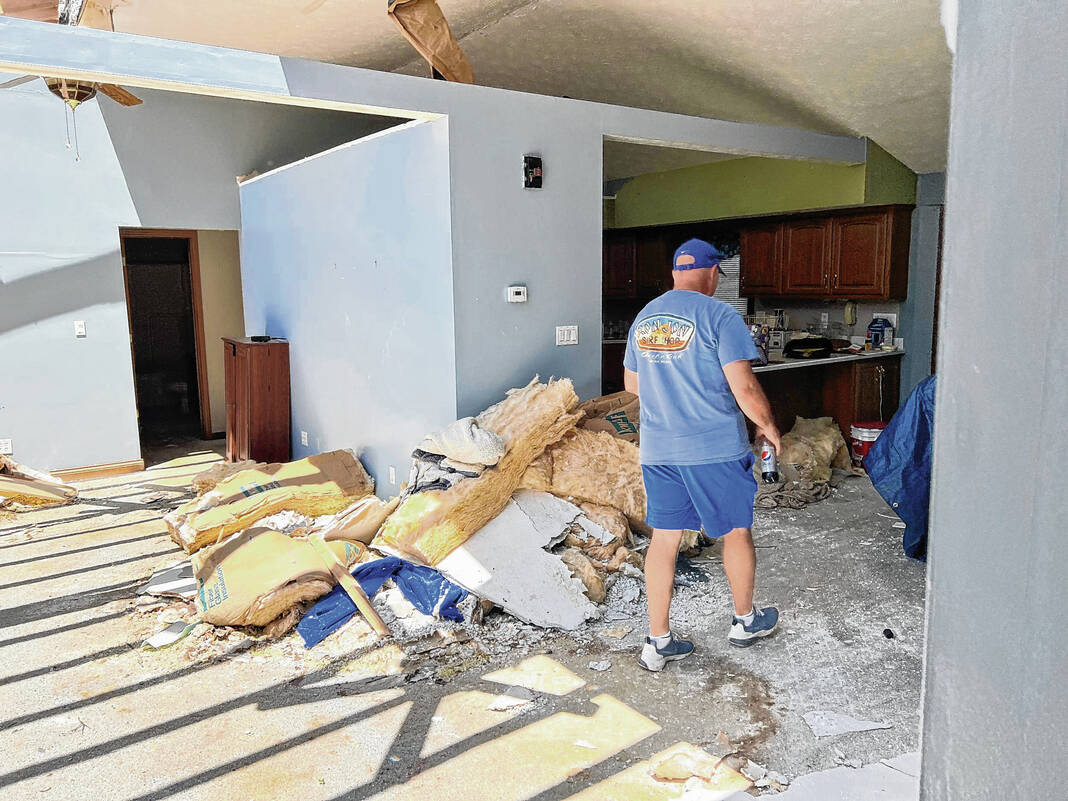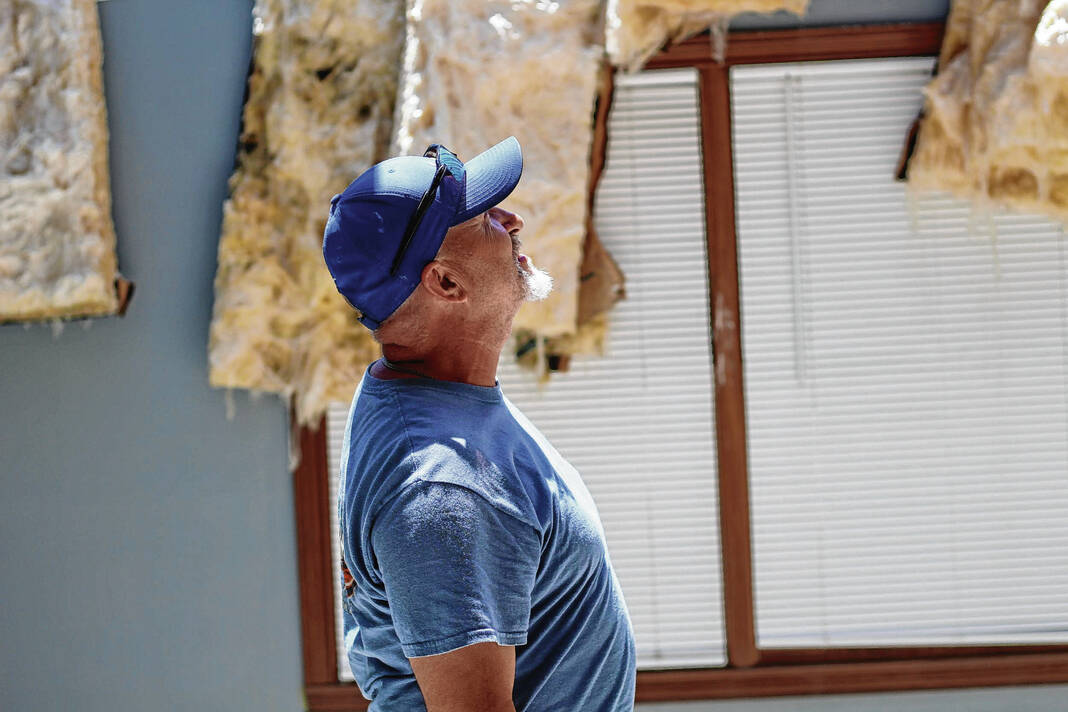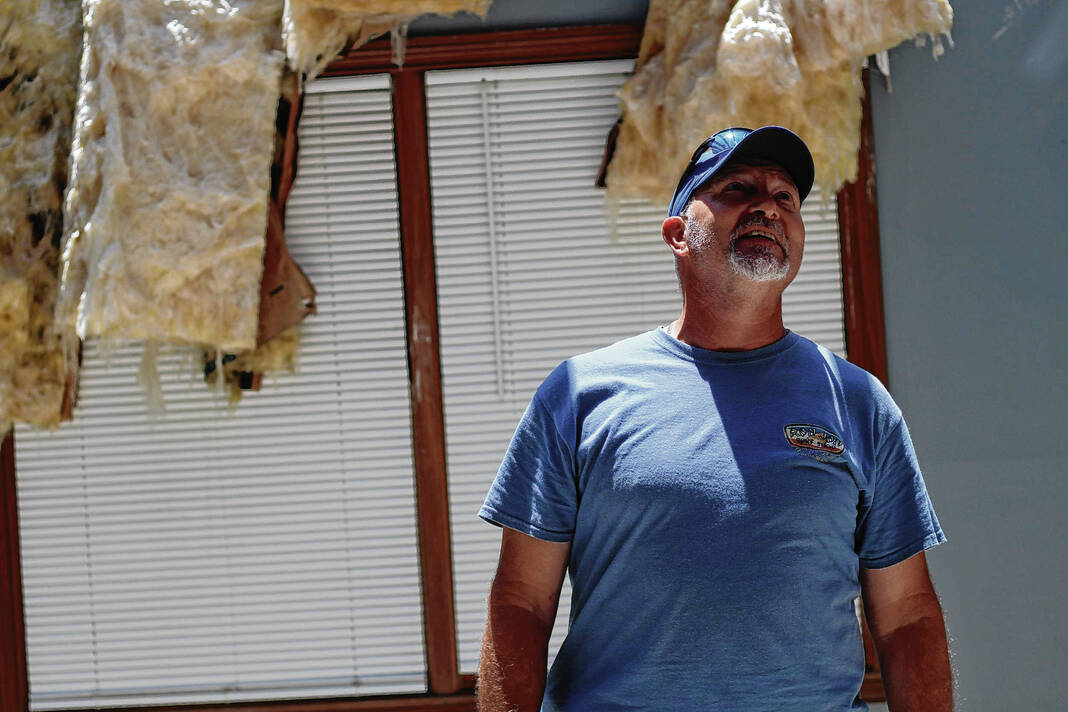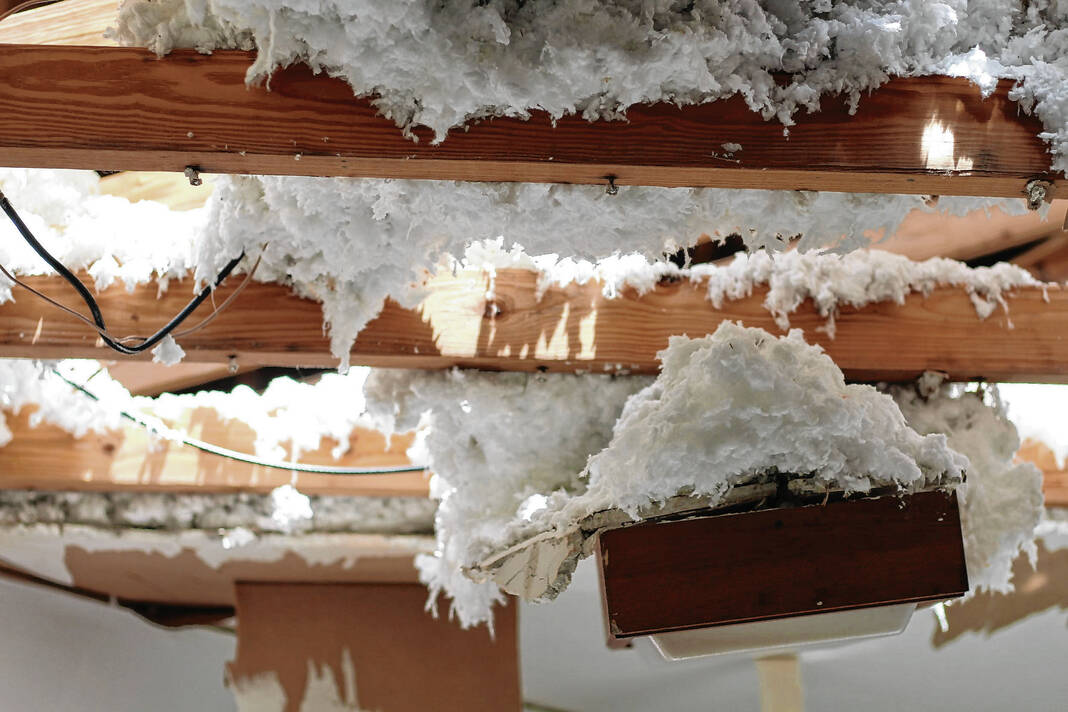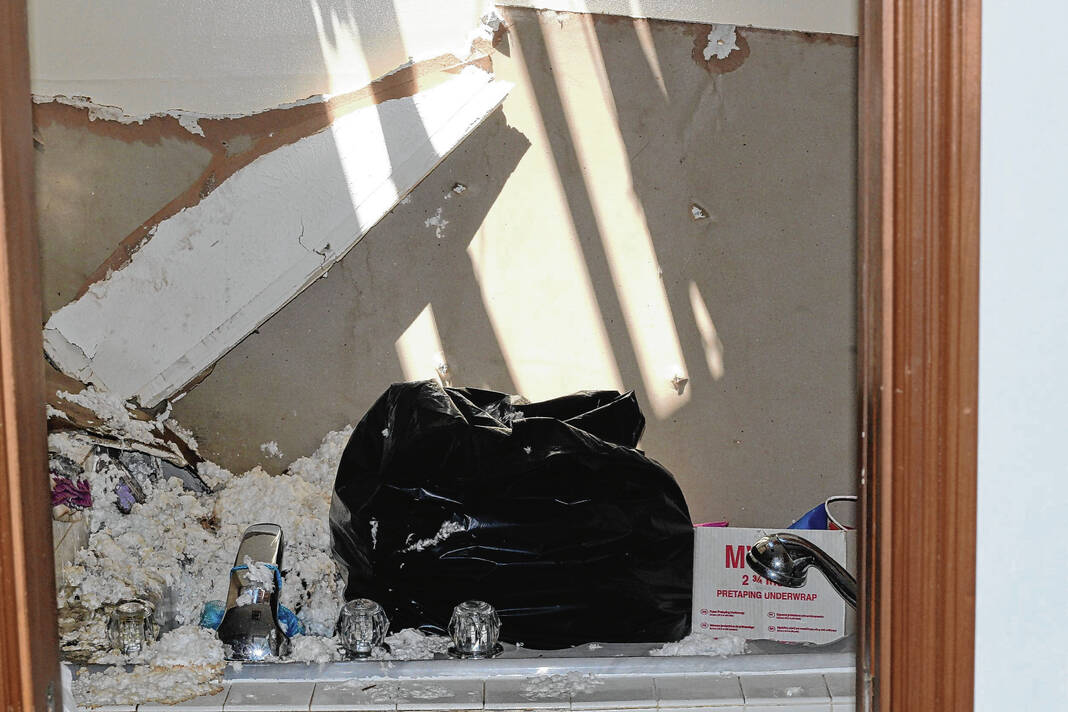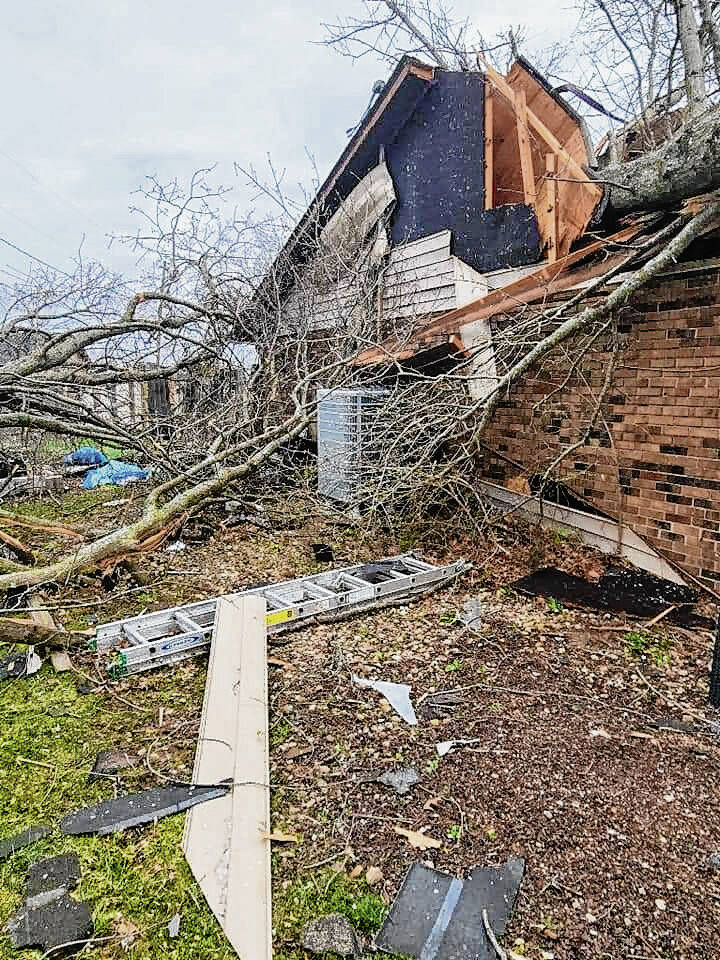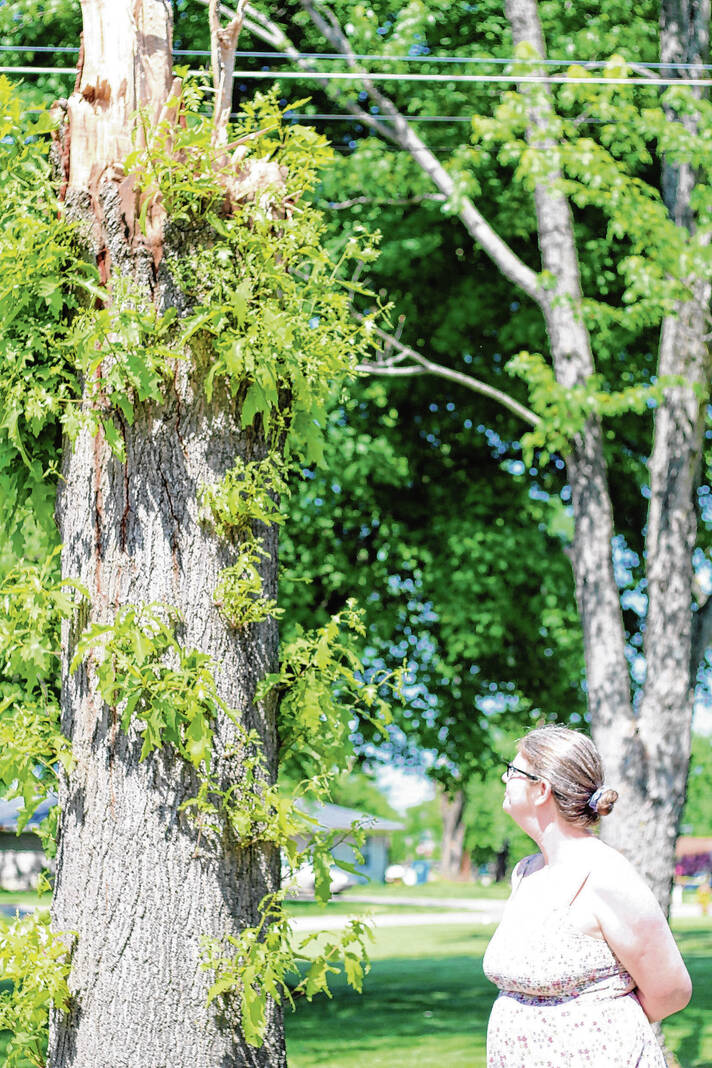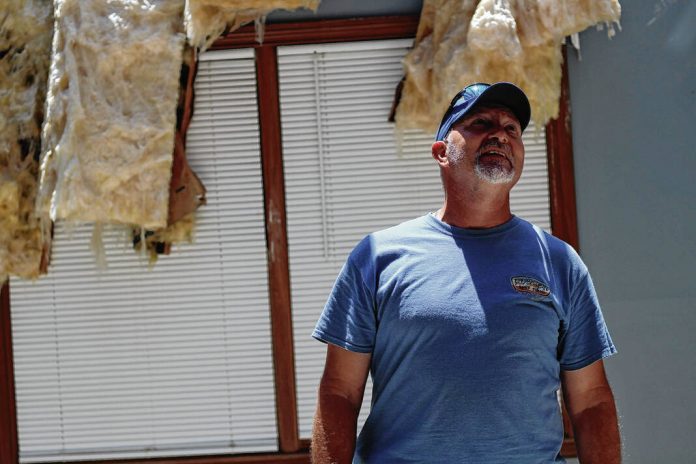
Whiteland resident Robert Stuck looks up at what’s left of his roof on Thursday. His house in the Park Forest subdivision was destroyed by the March 31 tornado. Emily Ketterer | Daily Journal
Two months after a tornado destroyed and damaged over 100 homes in Whiteland, residents are in the long process of rebuilding.
Robert Stuck’s home in the Park Forest neighborhood was destroyed in the direct path of the tornado. The was roof ripped off most of the house, in the front room and front bedroom.
Two months later, it’s still standing, awaiting demolition. What the Stucks could salvage has been removed. The sun shines through the open holes in what’s left of the roof. Pieces of the ceiling and insulation scattered all over the floor of their living room, and the front bedroom. Nature has started to take over as it has rained over the last months, with the smell of mold lingering.
Stuck was home that night on March 31, with his wife, Amy, youngest daughter, Natalie, and her boyfriend. Stuck was listening to weather reports, and heard the warning for Whiteland residents to hunker down. He then heard what sounded like a freight train, assuming it must be the tornado.
He yelled at his family to “get down,” and in seconds, a door inside flew off and hit him. He watched as the roof came off. He ran into the laundry room and pulled down Amy in the laundry room. Natalie and her boyfriend ran into the back bathroom.
The tornado ripped through their house in about 17 seconds. They didn’t even realize the extent of the damage at the moment, because it was the middle of the night, so it was dark.
Stuck is thankful he and his family made it out largely unharmed, other than a few bruises and a missing tooth.
“It is something, you know. We survived. I had a big bruise on top of my head and had a goose egg on my knees where I was picked up and thrown around a little bit,” Stuck said.
The recovery process
The Stucks plan to completely rebuild their home. They hired Duke Homes to rebuild their house almost exactly how it was. They want to come back, Stuck said.
“We’re not going anywhere. We love this place,” he said.
There are a lot of memories in the home, which Stuck and his whole family built themselves 27 years ago.
“People always say that ‘oh, you can rebuild…’ but it’s memories, you know,” Stuck said. “We as a family built this house.”
It’s a long road forward. The house hasn’t been set for demolition yet. Stuck expects the entire rebuild to take about a year.
His family has lived in around five different places in the last two months, he said. They now live more permanently in an apartment in Greenwood, which their insurance is paying for until their house is ready.
“It’s gonna be home until I move into my permanent home again,” Stuck said.
Insurance woes
Many residents in Whiteland have reported frustration while dealing with insurance to cover the losses in their homes.
Stuck described the process as terrible, so far. He’s had five adjusters come to his house in the last two months. The process of filing claims and waiting to hear back to start rebuilding is grueling.
Stuck has also heard from several of his neighbors who also said they are struggling with insurance to pay for certain fixes to their homes.
“It’s just my opinion, but they can do a lot more for everyone with what’s been going on,” Stuck said.
FEMA did help them some, but they are mostly going through insurance, Stuck said.
Across U.S. 31 in the Spring Hill neighborhood, Carrie Thompson Mick, her husband and three children have been living in a Residence Inn for the past two months as they wait for roof repairs on their home on Greensprings Drive.
The tornado ripped right by their house, knocking over a massive oak tree in their yard. The tree fell on their garage and the family room in their house, caving in parts of the roof.
Mick has also been battling her insurance company for the last two months, waiting on claims and checks to process. When an insurance adjuster eventually came to their house, they originally had said the damage would be about $13,000. However, a contractor said the damage was more severe than that.
“Our contractor submitted a secondary rebuttal. They brought in a structural engineer, and I sent pictures and pictures. So State Farm sent us another $18,000,” she said.
The waiting process is frustrating as well, she said. She thought the family would be back in their house by now.
“We can’t get anybody to talk to us. Like we went through like two different adjusters and all this,” Mick said.
Carmen Young, Whiteland acting town manager and community development director, said insurance issues are one of the biggest issues she’s heard from residents as they rebuild.
Young noted that residents can get free legal advice in disaster-affected counties through Disaster Legal Services (DLS). DLS is another agency helping the Federal Emergency Management Agency, or FEMA, with disaster recovery.
DLS can help with problems such as insurance claims for loss of property or medical bills. Services are also available for lost documents, home repair contracts and contractors, landlord and tenant issues, proof of home ownership and FEMA ineligibility appeals.
Residents can call the DLS hotline at 1-844-243-8570.
Town building repairs in limbo
The town of Whiteland is also awaiting to rebuild and replace its damaged properties, including the Whiteland Fire Department, the street department and the wastewater treatment plant.
Young is still waiting for an engineering report from the town’s insurance company. The town did receive insurance money to get started, but they are waiting to spend it to make sure it’s spent properly, she said.
One building was destroyed at the wastewater treatment plant, which was in the direct path of the tornado. That building contained some equipment and vehicles that needed to be replaced, Young said. The building was pushed onto another building, which then damaged the belt press of the treatment plant.
“We’re functional, everything’s functioning, it’s just functioning in a different way than what it is used to for now. Getting that belt press back up and working will be huge,” Young said.
The street department also suffered damage to its building and vehicles. The Whiteland Fire Department, which is half-destroyed, is still housed at the New Whiteland Fire Department until a temporary space is found.
Building code problems
Part of the delays on rebuilds in some areas of town had to do with zoning codes.
Pearl Street, which saw the most damage, is one of the older areas in town. Those houses are smaller, and built with different building codes than what Whiteland has now. If 75% of a house is destroyed, it is supposed to be built back to current standards, according to town code.
Some of the current building codes cannot be met. For example, the minimum lot width for a house zoned R-3 in Whiteland is 70 feet now. But the houses on Pearl Street were on 50-foot wide lots, Young said. Homes in Whiteland also have a certain percentage of masonry.
An initial thought was to have residents go through a variance process, which would require them to go through the town Board of Zoning Appeals. That is a bit of a process that would require going to a once-a-month meeting when homeowners are anxious to rebuild their lives back.
To make the process easier on residents, the Whiteland Town Council gave Young permission to grant variance requests at her discretion, without the formal BZA process.
“I mean, basically, they don’t need to build it worse than it was before, would be kind of my thought,” Town Council President Joe Sayler said at the May council meeting.
Rebuilt houses will still need to be built to current state safety standards, such as requirements to anchor the house to the foundation, Young said. Some of the homes were not anchored, according to the damage reports from the National Weather Service in April.
Manufactured homes will also not be allowed, even if they would replace a manufactured home that the tornado destroyed, she said. The main leniency the town is planning to allow is for the lot setbacks and the masonry requirements. Young said.
What’s next
Stuck is hoping to get demolition started on his home soon. He’s expected to meet with Duke to go over the rebuild plans in the coming days, he said. He hopes to move into a rebuilt house next year.
Looking at recovery in the long run, a Long-Term Recovery Group has been formed to help fill unmet needs for tornado survivors after going through insurance and FEMA. That group is expected to remain for the next year.
Whiteland is also still holding its annual community day, titled Community Night Out on July 28. All proceeds from the event will go towards the Whiteland Tornado Long-Term Recovery Effort. There will be live music, free food, activities and fireworks sponsored by Bailey and Wood.
The event was already planned before the tornado, but now it takes on a new meaning to bring the community together again, Young said. Many have gone back to business as usual since the initial response to the tornado recovery two months ago.
“It’s just to bring everybody together again and say, ‘Hey, we’re still here. We care about you,’” Young said. “We want to do what we can to get everybody back in their home.”


